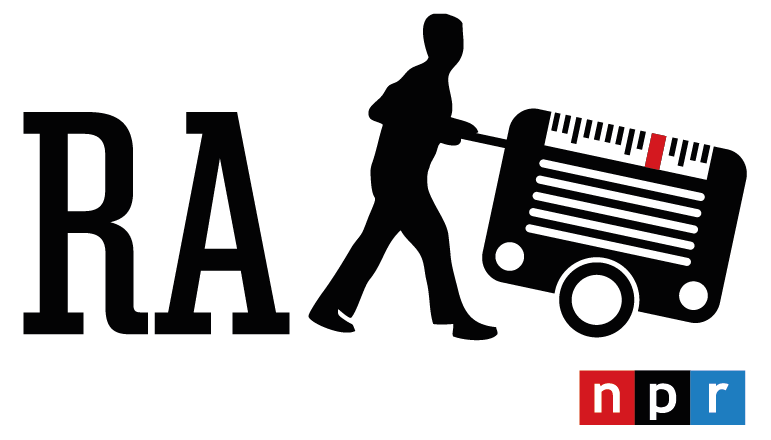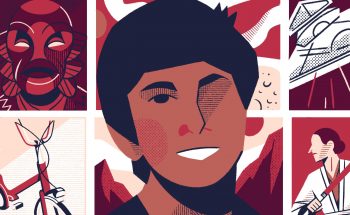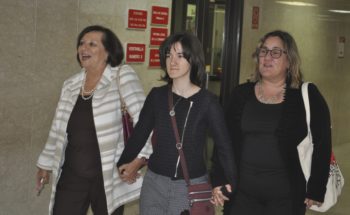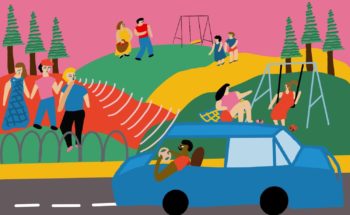
Translation: We Are Builders
Share:
Daniel Alarcón: Did you know NPR has an app? It’s called NPR One and it offers the best from public radio and beyond. News, local stories, and your favorite podcasts. NPR One joins you while you travel, wait in line or wait for a friend. Find us on NPR One in your app store.
Welcome to Radio Ambulante, from NPR. I’m Daniel Alarcón. Now that we are part of NPR we want to share some of our favorite stories with our new audience. So let’s start today in Cavanagh, Argentina. It’s a small town in the rural zone of the Córdoba province.
Elio: I am Elio Zampelunghe, I was born on April 2nd, 1933. My profession is farmer. In regards to studying, I did up to third grade; third grade in elementary school.
Daniel: Elio and his brother, Jorge Zampelunghe, grew up during the 30s, and there, in the middle of nowhere, they dedicated their time to invent machines.
Our producers Ariel Placencia and Luciano Daniele visited Elio, who is 80 years old today and lives in the same house and has the same shop. Luciano Daniele tells us more.
Luciano: When I arrived at Elio’s house, he was about to head out for mass. He asked me to wait for him and told me his house and his shed where there, open for me, to feel free to look around and grab whatever I wanted.
Without hesitation, I entered his shop and found the summary of what had been the life of the brothers Zampelunghe: not only the inventions and artifacts they built since they were kids, but also thousands of pieces of iron, wood, pulleys, many tools –some rusted and others not– and that rustic but loyal motor which gave form to many of their inventions.
When Elio came back from mass, he found me examining the whole shop and tried to explain that the same curiosity was what started him on the path of invention. In spite of his shyness, when I asked about his childhood, he started describing this town in which he grew up.
Elio: It was very deserted, there were few houses, very very few. Later it started growing. A cute little town, very quiet. I’ve always liked Cavanagh.
Luciano: In the countryside where they lived there wasn’t electricity and the town is roughly two miles away. They lived, today still, from farming and raising livestock. Not even today there is drinking water –they get it from a well. And back then, there wasn’t access to the radio. Once in a while they would get one or another newspaper from the capital of Córdoba.
It was the beginning of the forties. The only contact with the outside world was the small school that Elio attended with his brother. By not having anything to entertain himself with, Elio spent his time laying down in the grass watching how the spraying planes flew by… He became obsessed with airplanes:
Elio: When I was seven or eight years old it got into my head that I wanted to make a plane. My biggest passion was to make a plane, not so much the desire to fly, but to make it and watch it fly. And when my brother was older, I told him and he begun having more enthusiasm than me to make a plane, even though it was me who started wanting to do it.
Luciano: The brothers found out that an American magazine called Popular Mechanic existed and begged their parents to get it. This magazine existed since 1902 and the idea was to introduce the readers to the “do it yourself” idea, emphasizing how science and technology could be applied to daily life. The Latin American version became available in Argentina since 1947 and was one of the few reading materials that came to the hands of the Zampelunghe brothers:
Commercial 1: “Modernize yourself, make an airplane.”
Commercial 2: “The metallic plane you can build.”
Commercial 3: “You can also travel to space.”
Luciano: Headlines like these fired off the inventiveness that Elio recognizes having since he was little and which he transmitted to his brother. But that fondness for propellers and turbines was not easy to implement. They had to learn everything themselves. The making of the plane had several challenges, but one in particular: money. The Zampelunghe resolved everything by opening a shop in their ranch.
Elio: Once we made some money we went searching for a motor. We went to a flying club, and the one who took care of us… I am not sure if he was the President of the club or the owner of the motor, but he asked us: “What are you going to use it for?” “We want to make a plane” “But –he says– are you engineers?” “Bah, what engineers…” “And if you make it, you won’t pretend it will fly, would you?” We left that place very discouraged.
Luciano: That experience started a complicated relationship with the plane and its future. The brothers realized that by saying the truth about their plans, people laughed at them, so they decided to tell lies and say the motor was for a boat.
Elio: And that’s how we were able to get it much easier. But the one who sold us the motor was not very convinced. He even went to our farm, and that’s when he confirmed we were making a plane, not a boat.
Luciano: He even convinced them to stop their pursuit. And that’s how it went for a few years, until one day they decided to continue building their plane. The problems like lack of resources, electric energy and even the absence of plans were resolved little by little.
Elio: There weren’t plans, there wasn’t any of that. Magazines yes, but measurements and other things, there was none of that. The measurement of how long a plane is I didn’t have. We did our own calculations. We used chalk or pieces of wood to mark the shape of the plane, that was all.
Luciano: The news that the Zampelunghe brothers went back to the plane project didn’t take long to spread around the town.
Elio: When we were in town, the people, some, would tease us saying: “With pliers and a hammer you pretend to build a plane? Impossible.” People would really discourage us. Maybe they were right, I don’t know, but they would discourage us a lot. “It’s not going to fly, it’s not going to fly.”
Luciano: Graciela Bártoli, one of the brother’s neighbors, remembers well the divided opinions people had:
Graciela Bártoli: Yes, I remember the commotion, and… it wasn’t easy to think: “ok, they made a plane and it’s going to fly.” Some believed in them and some said: “Nah, there is no way it’s going to land, it will crash”. And others said that knowing how the brothers were, they were sure it would work.
Luciano: After two years of hard work, the plane was finished. Elio was 30 years old and Jorge was 20.
Elio: But then, the biggest hurdle came: Who was going to fly it? Neither one of us was a pilot.
Luciano: So they had to find someone willing to take the risk of flying a plane made at home. According to Elio…
Elio: Two pilots from a nearby town found out about this pursuit. They were José Araya and Líbero Biondi, so they came. When they saw the plane, how well done it was, they had faith it would fly well.
Luciano: Líbero Biondi, a pilot by profession, still remembers that moment, even though, according to his version, the Zampelunghe brothers were the ones who came looking for him and convinced him to fly the plane.
Líbero: There weren’t many pilots back then. I was one of the few. So they came looking for me and convinced me. One day they invited me to eat asado and, incidentally, fly the plane. They told me about their hope that the plane would fly, that they wanted to know if it was going to fly or not.
Luciano: Libero, without hesitation, accepted the offer.
Libero: I remember I told them, “Look”, I said, “Zampelunghe, I am not responsible if I crash it upon landing”.
Luciano: But Libero assured us he didn’t agree to the challenge for being brave.
Libero: No, I was always kind of a coward. It’s true that I was young, the age of risks I guess. So back then one would do just about anything. I was maybe 27 or 28 years old.
Daniel: After the asado, came the final moment. After the break, we’ll know if the plane flew or not.
—————
Thank you for listening to Radio Ambulante. Before we go back to our story I want to tell you about another NPR podcast, one about music, called Alt.Latino. It’s hosted by Felix Contreras, and Felix is your guide into the world of Latino arts and culture. An alternative approach to traditional music. Interviews with cultural icons like Rita Moreno and Carlos Santana as well as contemporary vanguards like Calle 13 or author Junot Díaz. Find Alt.Latino on the NPR One app and at npr.org/podcasts
Before the break, we were at a crucial moment for the Zampelunghe brothers: whether the plane they had built flew or not. And well, here is Líbero, the pilot:
Líbero: Well, in reality it wasn’t so easy because there was a pig pasture and to take flight they had to take some wiring off. On the first try to take flight the motor froze. So I tried again and it happened on the second try as well. That’s when I realized I had about 10 or 15 liters of nafta, and once we changed positions in order to take flight nothing was going to the carburetor. It would start and stop.
Luciano: So they decided to put 20 liters of nafta, to see what happened.
Líbero: And it worked, yes.
Elio: They grabbed it and took it out to the end of the pasture and they accelerated. We were ecstatic when we saw it in the air! But the fear was too much…
Líbero: No… when I was in the air I was a little bit worried. I was afraid to crash the plane when I landed, so I didn’t have time to look around. And yes, I was scared.
I did a big loop and remember that when I wanted to turn, the plane didn’t follow my commands, and I was a little worried. So I did a turn and pointed towards the pasture so I was able to land it without breaking anything with a lot of luck.
Elio: The feeling we felt when the plane landed is hard to explain.
Líbero: The Zampelunghe brothers, for them it was spectacular, they even cried. Later on, people came from the nearby town Cavanagh, and would come and congratulate me for my flight over Cavanagh. I was surprised, I didn’t even realize I had flown over Cavanas because of my worry about landing and not crashing the plane. I didn’t even know where I flew by! So right there I found out that yes, I had flown over Cavanagh.
Luciano: The newspaper clippings that still decorate the Zampelunghe’s shop revive the feat. “And it flies above!”, that was the headline of the most important newspaper of the region. It was March of 1964 and the few media outlets of the time fell at the feet of Elio and Jorge. For the people of Cavanagh it was a great event, but not all its inhabitants believed the brother’s plane had flown, so they demanded a second flight.
Elio: So one year later a pilot from the city of Venado Tuerto came. And I told him: “Do a trip over the town so everyone can see you.”
Luciano: Venado Tuerto, he said. That’s the name of the city where the pilot came from. And everyone saw the plane the brothers had built, flying in the sky. To arrive to that moment had consumed the lives of Elio and Jorge. The dream that Elio had when he was just seven years old, materialized when he was 30. In a place like Cavanagh, in the 60s, a man his age already had a wife and children. Elio felt really old.
Elio: My passion about making the plane was so big that I was afraid to get married. I’m sure some girl would like me. But if I married to a woman who was the plane, then my dream was over. So after the plane flew I was already 30 years old. “Ok, let’s go find a girlfriend.” Girls didn’t fancy me anymore. I had to continue alone.
Luciano: The phrase “continue alone” for Elio means to continue side by side with his brother, spend the days at the farm with his parents, farming and working primarily at the shop, dedicating many hours to new mechanical creatures.
Elio: We made a turbine. It took more than twenty years to perfect it. When we saw that, more or less, it was strong enough to push, we designed a four-wheeled carriage and put it on top of it. It would go up to 40 or 50 kilometers, but the noise was too much, very loud. One night we decided to drive it around town, but the townspeople didn’t know we had built that turbine. It was really late and most people were sleeping, so they got out of bed and starting looking up into the sky thinking it was a plane, but it wasn’t.
Luciano: Today, two helicopters they built still rest in the shed, but nobody dared to pilot them. Nevertheless, Elio didn’t want to stay with the doubt of whether they worked or not, so he remembers that on his own, he decided to tie the helicopter to a tree. And as if it was a puppet, he managed to handle the remote controls from a distance and was able to make it take off.
Elio: One of them, yes, I was able to fly, but I didn’t make it go much, I wasn’t able to. Initially, to test it, I tied it outside [rooster crowing] and piloted it with strings to accelerate and raise it.
Luciano: Elio’s passion for inventions always kept him isolated from the community. He fought constantly with everyone but always had his brother on his side. Elio and Jorge against all those who said they could not achieve their goals, since they were boys. Today, Elio, at his 80 years of age, has to fight with one of his worst opponents: the solitude of his days. Because his brother died a year ago.
Elio: It’s a lot of sadness. It hurts, it hurts like crazy, but what’s one to do. In life is better not to love so much. I am not sure if there is a catechism that says: “You have to love yourself much more”. No, I don’t believe in that. Because if you love yourself that much, you don’t feel so much. But when you love someone else, yes.
Luciano: Elio continues working at his shop and continues dreaming of his machines. He fights the pain of his arthritis by working, and even though he doesn’t tell us much about his new project, he lets us know he is making a carriage and wants to surprise the town of Cavanagh one more time.
Elio: If it runs it’s going to be beautiful. I want to drive it around town.
Luciano: It’s 6:00 pm when I tell Elio that is time for me to leave, but it looks as if Elio wants to delay my departure and extend our Sunday. He tells me:
Elio: I have an instrument!
Luciano: He’s talking about an accordion his father gave him when he was 30 years old. He tells me that after his plane flew, he took private classes. He takes it out and surprises me when he plays it with those rough fingers which have worked a 5-kg hammer.
[Song: El aeroplano]
Elio saved for the end the ultimate surprise: the only tune he remembers from memory is from a valts called “The Airplane”.
Daniel: Luciano Daniele and Ariel Placencia are journalists and live in the city of Rosario, Argentina. This story was edited by me, Daniel Alarcón, and Camila Segura. Thanks a lot to Sokio, from Punk Productions
The rest of the Radio Ambulante team includes Silvia Viñas, Fe Martínez, Luis Trelles, Elsa Liliana Ulloa, Barbara Sawhill, and Caro Rolando. Our interns are Emiliano Rodríguez, Andrés Azpiri and Luis Fernando Vargas. Carolina Guerrero is the CEO.
Learn more about Radio Ambulante and this story on our website. www.radioambulante.org. Radio Ambulante tells the stories of Latin America. I’m Daniel Alarcón. Thanks for listening.





